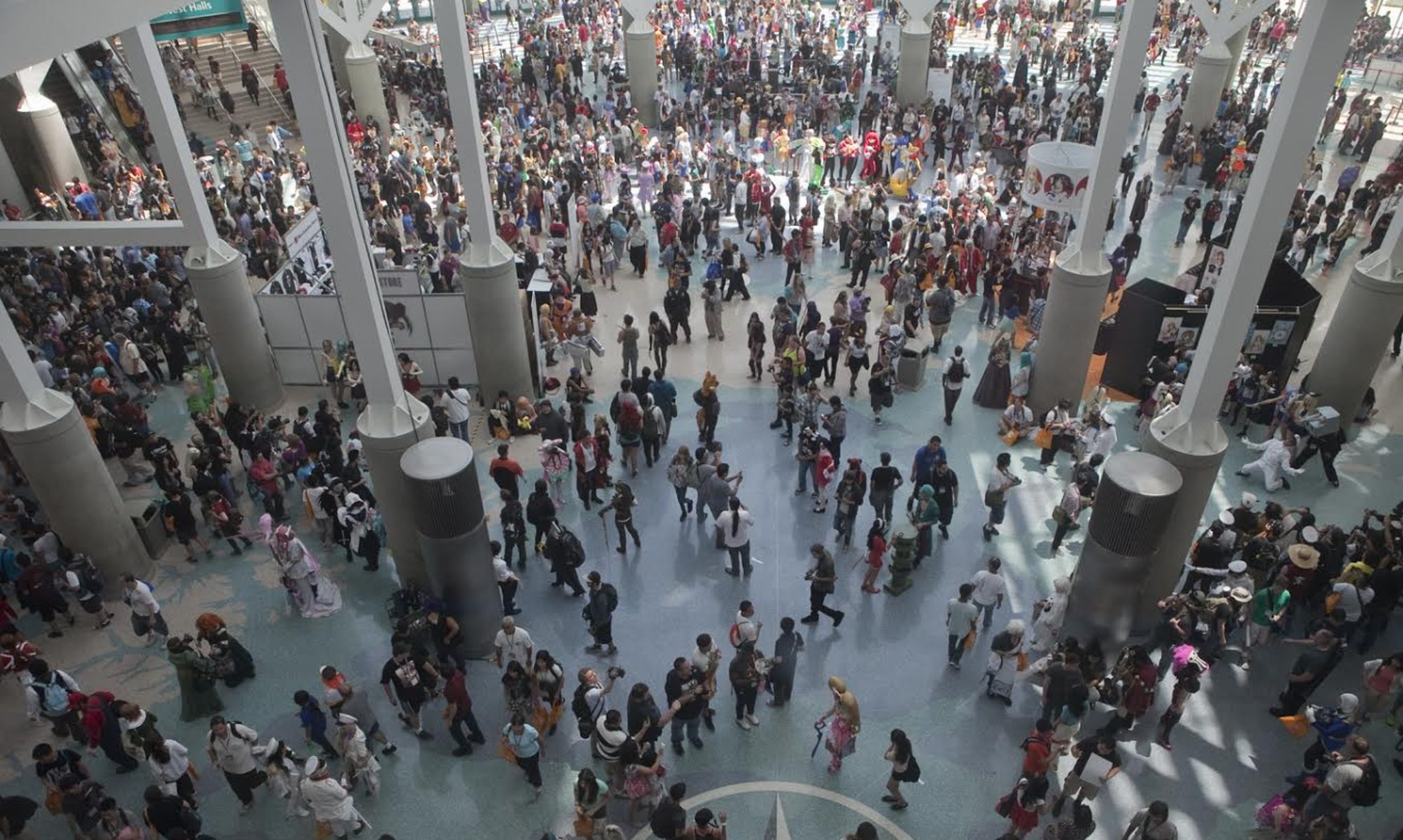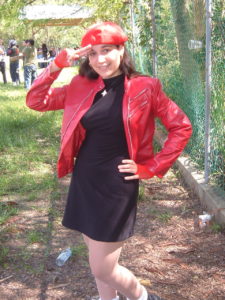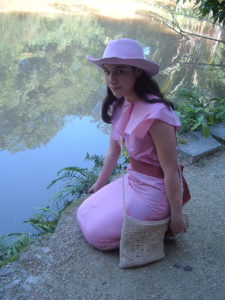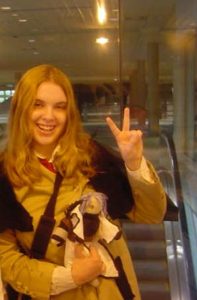Age: 34
Location: New Jersey
When did you discover anime? Share as much as you remember. I had always been aware of the spiky-hair designs in the back of gaming magazines (envelope art and import shops in places like Electronic Gaming Monthly). I was into games, and games alone, but had been growing to notice how clearly some aesthetics were distinctly Japanese. It wasn’t until a friend (who was into American comics, namely Spawn) prodded me to check out a super cool cartoon the following weekend that I finally learned what “anime” was. What I saw was the second episode of the original 1996 syndication broadcast of Funimation’s Dragon Ball Z English dub.
What appealed to you about anime when you first discovered it? I always enjoyed, even as a kid, getting in at the ground level of any new product, movement, or “fandom”. I don’t think I recognized it at the time, but there was a thrill in knowing things before anyone else, and trying to project what might catch on. (Later in life, I’d find my calling in marketing. Go figure.)
Otherwise, it was just how “different” anime felt. It was clear this was something unique compared to the other shows on at the time; I think to things like the USA Action Extreme Team lineup (Street Fighter cartoon among all the other video game adaptations). For Dragon Ball in particular, it was a serialized story with an ever-growing cast of characters. It could be an investment (in all senses of the word: emotional, time, monetary). For someone who moved a lot as a kid, it was also a way to quickly find new friends that had a similar intense degree of enthusiasm; if you were into it, you were INTO it. Twenty years later, I’m still running a Dragon Ball website!
What would you say was the most popular anime at the time? From my perspective it was Dragon Ball, but obviously Sailor Moon was the next thing we could grab onto. Anything in the “Japanimation” section at Blockbuster was second-tier by virtue of it simply being available (Vampire Hunter D, Akira, Ghost in the Shell, etc.), followed by whatever aired on Sci-Fi’s Saturday Anime block.
What was it like to be a part of anime fandom at the time? My perspective has always been one of in-person but also unique in that it was not just online in terms of general discussion with other fans, but also from a management perspective. I got into Dragon Ball in 1996, and began my website in January 1998. Sure, it was garbage for a while, but it quickly grew into something significant. Dragon Ball web traffic was insane over the next few years, and having a second-generation Dragon Ball fan site ready to go for the upcoming boom meant learning a lot of lessons about design, presentation, moderation, content management, etc. Quite frankly, it was an amazing self-discovery process by proxy of anime.
For quite some time, “fandom” was defined by learning more and more about the show, and therefore learning more and more about what was changed in its dub. I’ve come to the conclusion that we as the new fans effectively ruined all legitimate discourse of the series for several years. There were no meaningful discussions about the series itself anymore; it was all about the changes. It took years and years for that to recover, and only did so once we finally received uncut/bilingual products and were able to let the franchise rest/die for an extended period of time to then refocus… and quite frankly, for us all to grow up a little bit.
What inspired you to start your own Dragon Ball website? Were other fan sites part of it? When I started my site in January 1998, there was already an established base of comprehensive, well-known, authoritative Dragon Ball fansites (namely Wuken’s Suushinchuu). I didn’t feel that I had anything to add at that level, but I was still desperate to get involved and produce SOMETHING. That started with VegettoEX’s Ultimate DBZ Links Page on my AOL web space. Even then, I still had nothing to really offer; everyone knew all five or six of the good sites already, so who needed a links page?! It was a way to get started, though. I quickly found myself recording audio files and writing (terrible) reviews, so that helped the site expand into VegettoEX’s Home Page. Even THAT began to take a turn with the kind of content and news coverage I wanted to focus on, and at some point in 1999 it became Daizenshuu EX, which I ran until 2012 with our merger with Kanzentai into Kanzenshuu.
All that time, I was continuously looking to other sites to see what they were doing, and more importantly, what we could do better. Something I had always been fascinated with was the series’ music, and while there were decent CD listings in things like Dr. Briefs’ DBZ FAQ, new products were coming out and I was beginning to pick up on mistranslations. I aimed to build the largest, most-comprehensive listing of Dragon Ball music out there, and we accomplished that! I then looked to our music database as the template for other guides we could create. I looked to clean website designs and great color choices like SREDBZ had; I can directly trace back my love of yellow and blue back to Scott’s site right there. I wanted it to be a welcoming site with just the right kind of fun personality, but also that authoritative tone. I don’t think we got there for quite some time, but we eventually did!
The “golden era” of Dragon Ball fansites feels like it ran from about 1997 to 2002. The first generation of raw Japanese and fansub-based fans left an incredible base for us to work from, and Funimation still actively producing the show for the first time gave us plenty of contemporary material to work with. We had a lot of fun, but a lot of us were also still pretty young (late teenage years). We drove the old guard out while we were coming to grips with early Internet culture. While most of it was in good fun (the title tag wars with Planet Namek, for example), there was also a ton of histrionics and grudges that we never truly understood the origins of. Kids being kids.
I looked to the types of dub-specific coverage we were all getting trapped into, and reflected on what we might be able to offer as a simultaneous contrast and complement to that. I brought Julian on board in 2003, which allowed our Japanese news coverage and translations to immediately set us apart. For a whole slew of reasons (web advertising crash, completion of Funimation’s first run of the dub, people just generally losing interest, etc.), most of the other sites of the era closed up shop. At some point, we were essentially all that was left! We had such an incredible base of our own at that point, so I made it a priority for us to stick around and provide the best Dragon Ball coverage we could for as long as we could.
What has been the most rewarding part of running a site like this? I learn something new every day. You might think that after running a series-specific website for nearly twenty years you’ve seen all there is to see, but that’s just not true. Whether it’s a little factoid about the series’ production, some funny new quote from an ancient interview, or even a recently-unearthed character design, there’s always something new out there for you.
Oh, and that whole “making new friends” thing, I guess…! It’s so funny looking back on the days of meeting some random person in a chat room or newsgroup and saying “hey um would you like to work on my website with me?” I can’t imagine handing a password over to a random person like that anymore! That’s how it was back then, though. Today Kanzenshuu is run by four people, all of whom I speak with on a daily basis… and not just about Dragon Ball! These are easily some of my best friends in the world.
Are there any opportunities you wouldn’t have had if you didn’t run Kanzenshuu? My website has served as the basis for everything I do now in my professional life. From content management to design to marketing, it all traces directly back to VegettoEX’s Ultimate DBZ Links Page. When I was in college, there were marketing degrees, sure, and there were IT degrees, sure… but the rest of the curriculum was still trying to catch up with how content on the Internet fit into all of that. While the educators struggled with that, I figured it all out on my own courtesy of Dragon Ball.
It’s clear you have a major connection with the Dragon Ball franchise over other anime series. What is it about Dragon Ball that resonates with you? Have any other series come close to making you feel the same way? I figure I’m the same as most people: what you see first is what leaves the biggest impression on you. Beyond that, though, I love the ensemble cast, I love the music, I love the character designs, I love the writing style… it’s just everything I love wrapped up into one, ever-expanding package.
The amount of head-space dedicated to Dragon Ball makes it difficult to really get absorbed into other franchises. That’s not to say I don’t read/watch other things, and that’s not to say I don’t enjoy some of them an incredible amount, but the bar has been set pretty high. Dragon Ball is just so approachable, so easy, so comfortable, and yet has enough layers to dive into if you really want to nerd out over any given aspect.
That all being said, Futurama is my other not-so-secret love. I’d probably be running the Futurama equivalent of Kanzenshuu today were it not for Dragon Ball. It’s possible and likely that I’ve heard Billy West’s voice more in my life than Masako Nozawa’s, which shocks a lot of people!
Would it be possible to build a site like Kanzenshuu today? Why or why not? It’s certainly possible, but I don’t know what level of crazy you’d have to be to attempt it. I wish people WOULD do it! What we have is the result of four people investing years and years of prior work into something, all brought together into one complete package. It’s something we do because we love the series, and have this irresistible urge to document and share. To start completely fresh? I can’t imagine that. It would have to be with a new series that you place your bets on and hope it becomes something huge; that way you have your foot in the door for everything as it comes out. Start small, but stay comprehensive. That’s not to say we were first in line with Dragon Ball – far from it. We took the downtime opportunities we had, though, and threw everything we had at it at times in our lives where we had the free time to do so. People often ask us what theme we used for the site, or where we downloaded all of our stuff, etc. We have to explain to them that we built it all ourselves, bought it all ourselves, fact-checked it all ourselves, and translated it all ourselves. It’s something that takes time and dedication.
Today? Isn’t it easier to just launch a Tumblr with some magazine scans you can’t read? Run a Twitter account collecting everything you find? Make some YouTube videos talking over game footage? Start up or take over an existing subreddit? Try to clean up someone else’s mess on Wikia?
You can probably sense the combination of jealousy and contempt in that description! It’s just so easy to launch a platform these days with zero costs (other than a lack of true content ownership). We never had those opportunities. Just like most people wouldn’t know how to launch something like Kanzenshuu, we wouldn’t know how to launch something modern and laser-focused in its delivery. We’re stuck in and a relic of the Internet past. We’re not a blog. We’re not a traditional news site. We’re not a video channel. We’re not an official resource. We don’t have quick-bites for people to digest. There’s no money to be made, and no fame to bask in.
But we also wouldn’t have it any other way! I don’t truly hold anything against anyone for wanting to go a different route; just like I made a dinky links page in 1998, people should do what makes them happy and what allows them to have fun with the series they love so much. It’s that personal engagement and sense of accomplishment that kept us going, and I wish that every fan could find something so fulfilling.
What makes my day is when people tell me they “wish there was a Kanzenshuu for ________.” I couldn’t ask for a better compliment.
What’s the biggest contrast between anime fandom when you got into it and now? The obvious answer is probably piecemeal VHS fansubs vs. instant total availability on streaming services and home video. Whereas we would have been happy to get maybe six episodes of the Cell arc subtitled and two episodes of GT in raw Japanese and call it a day at that point, fans can sit back today and binge watch as much of the series (in chronological order) as they want!
That being said, the more things change, the more they stay the same. While in 1999 everyone created their own website with power level lists and Tenka’ichi Budokai brackets with a left-hand column navigation on a black background with website traffic/hit counters, in 2017 everyone has a YouTube channel with “What If?” theories and power level debates with subscription milestone celebration videos.
That’s not to say EVERYTHING truly is the same as it was back then. Something I’ve come to realize is that, when I was getting into the series and discovering its origins and changes for the American market, those changes dominated discussions… at the expense of all other topics. One of the recent projects on our site has been the “Press Archive” where we look back at Dragon Ball coverage from not just contemporary anime and gaming magazines of the day, but also things like newspaper articles and such. What’s clear is how well-versed in Dragon Ball the general anime fan was pre-Funimation, and how accurate the coverage and discourse could be. Sure, there were the occasional outlandish statements and clearly-fabricated tidbits in longer articles, but on the whole, things were pretty great. Once the English dub came to America, it feels like it completely sidelined all new initiatives. Magazine coverage went from enthusiastic to sick-of-hearing-about-it begrudging nods. Fans focused entirely on meticulously documenting all dub changes, yet never diving back to explore and document that original version that was supposedly being tarnished so much. All the meanwhile, an enormous group of new fans were coming in via the Toonami broadcast; being so young at the time, they wouldn’t come online for another five to ten years, shocked to find that the now-old-guard (ourselves still feeling like the “new” fans!) had no respect or nostalgia for the version they were growing up with. Meanwhile, we were simultaneously shocked to realize there WAS an enthusiastic audience for these new voices and replacement music! These people weren’t parroting our opinions back at us; what had gone so horribly, horribly wrong?!
At least for Dragon Ball these days, I’m noticing how fans are simultaneously more specialized and more generalized than ever before. We’re so fortunate to have attracted fans from all walks of life to chat with us on Kanzenshuu; we have the animation experts, the background music experts, the in-universe experts, the directorial experts, etc. On the flipside, we’re seeing more and more fans that aim to have as broad an understanding and expertise as Kanzenshuu tries to present. That’s great for everyone!
And that’s what makes me excited. As Funimation makes strides in accuracy with their Dragon Ball treatment, and as the Japanese industry realizes that Dragon Ball is a global phenomenon and should be treated as such and shared with everyone simultaneously, so too are we seeing that turnaround from the younger generation of fans. They want to know who said what when. They want to know how that ties in to the production. They want to know why certain characters act differently than they remember from watching it growing up. They just want to LEARN. I see myself in them, and that makes me excited to continue doing what I do. There’s still a lot of growing to do as today’s communication platforms and the presenters mature, but the potential for even better news coverage, higher-quality translations, and in-depth documentation is sitting right there! Hopefully people remember Kanzenshuu along the way…! 🙂
Mike can be reached on Twitter.




